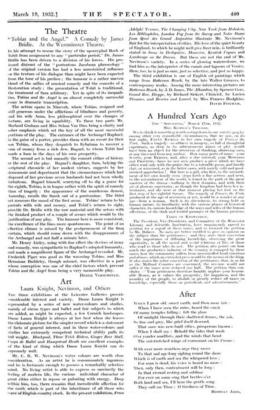A Hundred Years Ago
run " itrEcTAT.R,- mARcH 17tH, 1832.
Miss Kemsta's TRAGEDY.
We do think it. something worth tot fug down in our autobit-p flyby among other very remarkable circumstances, that we saw, on its first night, FANNY KENUILE ill her own tragedy of Francis the First. Such a tragedy—so affluent in imagery, so full of thoughtful experience, BO deep in its suitterraneons mines of plot—would have been an object for the attention of thinking, observing men, at any time and from any author. How many poets of name-- your 8C011`.4, your BYROM, and, after a due interval, your Alrmains and PROVTEIN—have we not seen produce a piece whirls we have either read only with the praise due to a tolerable poem, and hardly that, or witnessed, as in the latter eases, with merely cold and good- natured approbation I But hero is a girl, who first, to the astonials. silent of her own family even steps forth a fine actress and next, to the astonishment of the world, is found in the path of the groat masters of the drama—walking in their domains, and with their air of glorious superiority, as though the kingdom had been Iv^r in- heritance, tout she were at that moment placing nor foot on the first step of her rightful throe, The tragedy of Francis the First, produced at the ago of seventeen or not, would he a wonder nt any age—from a woman. Such is its shmusiness, its strong hold oM human nature, its familiarity with the various phases of historical ehararter, its curious knowledge of the ways and wiles of the Imo 11■11 affections, of the dark and fearful passages of the human passions,






































 Previous page
Previous page